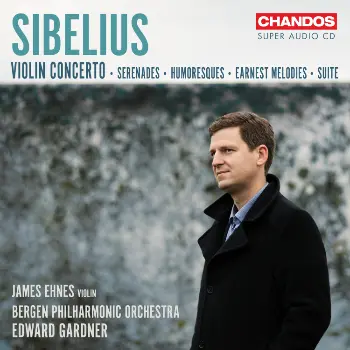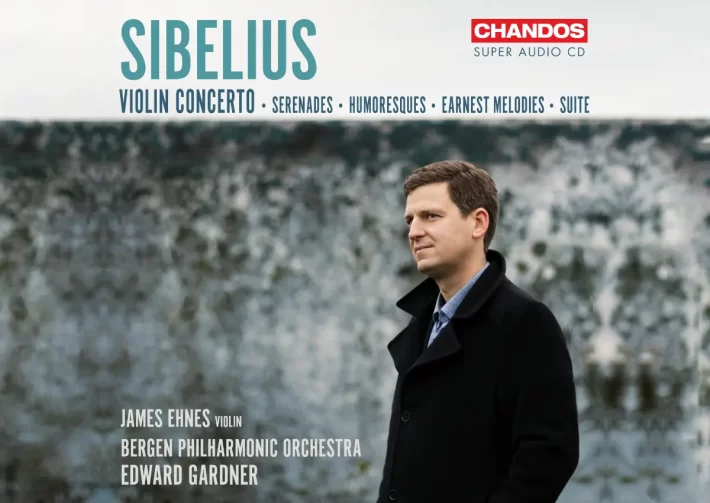This recording of the Sibelius violin concerto is long overdue – sessions for the album were canceled three times because of COVID lockdowns. Finally in August of last year, this team came together to record not only the concerto, but also the Humoresques (Op. 87 and 89), Two “Earnest” Melodies (Op. 77), Two Serenades (Op. 69), and the Suite for Violin & Strings in D minor (Op. 117), one of the composer’s last works before the thirty-year “silence of Järvenpää,” in which he completed no new major compositions.
The violin was Sibelius’s instrument: in his youth, he hoped to become a professional violinist, and while studying in Vienna (1890-91) he auditioned, unsuccessfully, to join the Vienna Philharmonic. His solo violin writing is wonderfully idiomatic, and often features passages of technically-challenging brilliance, which Ehnes dispatches with ease.
Ehnes’s playing in the opening movement of the concerto is uniformly impressive (the cadenza a true tour-de-force), but what really stands out is the partnership between these musicians. Gardner and his Bergen players bring out a wealth of detail, interacting with Ehnes in a particularly involving way. This is not merely an accurate accompaniment, but rather a true meeting of the minds, in which each part of the team supports and inspires the other.
In the slow movement the wide variety of color and bow weight Ehnes employs draw out every emotional strand. The final movement has tremendous drive, the increasingly complex rhythmic interplay delivering new levels of rambunctious energy – every player is having the time of their lives.
The six brief Humoresques (published in two sets) manage to explore a wide array of mood and character. In the first of Op. 87, there is gentle humor, while the incessant running figures in the second seem cut from the same cloth used for the concerto’s final movement. The first movement of Op. 89 conjures Mendelssohn’s Midsummer fairy music, followed by a forlorn, elegiac Andantino. The final two movements return to happier emotions.
Join The Classical Newsletter
Get weekly updates from The Classic Review delivered straight to your inbox.
The Op. 77 Two Earnest Melodies have Latin subtitles, suggesting a religious or spiritual connection. The first, Cantique, (subtitled ‘Laetare anima mea’/Rejoice, my soul), features gorgeous melodic writing (especially as played here), with a significant harp part in music that approaches, but never crosses over, into Victorian sentimentality. The second, Dévotion, (subtitled ‘Ab imo pectore’/from the bottom of my heart) delves into deeper emotional territory, its gently turning accompaniment suggestive of struggle for which the melody seeks out resolution.
Written in 1912-13, The Two Serenades (Op. 69) are more substantial, inhabiting the same atmosphere of the fourth and fifth symphonies. I expected the Suite for Violin and String Orchestra to have some struggle, to hear or sense the composer’s frustration with his rough compositional efforts (something I do find in the Four Orchestral Fragments, which date from 1930 or later). Yet there is none of that here, and the three movements have English titles suggesting Sibelius was hoping to reach a new market for his music. The playing in both is sweet and tender, most especially the second movement, which has the evocative subtitle “Evening in the Spring.”
The same program is available from Warner Classics, featuring Christian Tetzlaff and the Danish National Symphony Orchestra under Thomas Dausgaard. Tetzlaff‘s interpretations are more objective, and the engineered sound, fine as it is, does not match what Chandos provides here.
The liner booklet is exceptional, with an excellent discussion of the music by Daniel M. Grimley and biographical information for all performers. Recorded in Bergen’s Grieghallen in August 2023, the engineered sound has tremendous impact, clarity, and warmth. While some may prefer Janine Jansen’s more heart-on-sleeve approach in the concerto (reviewed here), Ehnes’s playing is technically immaculate and always musical, and it is wonderful to have an album that offers all of this repertoire in one program.

Recommended Comparisons (Violin Concerto)
Kremer | Shaham | Hahn | Heifetz
Sibelius
Violin Concerto, Op. 47
Two Humoresques, Op. 87
Four Humoresques, Op. 89
Two Pieces, Op. 77
Two Serenades, Op. 69
Suite, Op. 117, JS 185
James Ehnes – Violin
Bergen Philharmonic Orchestra
Edward Gardner – Conductor

Check offers of this album on Amazon.
Album Details |
|
|---|---|
| Album name | Sibelius – Violin Concerto |
| Label | Chandos |
| Catalogue No. | 5267 |
| Amazon Music link | Stream here |
| Apple Music link | Stream here |

















